I sometimes take a chance on a tea if it is recommended by people I trust, and this one was recommended by two such trustworthy souls, making it an easy purchase [many thanks to Dr. Mike/Psychopuncture and Geraldo]. A relatively good price for a five-year-old cake, this sells for $42 at Yunnan Sourcing. Note that the web-site has the factory name as "Fochaji" and the mountain as "Ailuoshan".
The factory is a Taiwanese venture, the owner of which buys leaves from the three Jingmai, Ailao, and Wuliang mountains. The name of the company translates literally as "Not tea-house" (a Zen refutation?). Ailaoshan is "Mournful Prison Mountain" - very melancholic.
The cake was photographed at dawn, and so the light plays tricks with the colours: it is a darkish brown in nature, rather than the orange that the sunrise would have you believe from the camera.
Brita-filtered water @ 100C in 12cl shengpu pot; ~7-9g leaf; 1 rinse
Dry leaf:
The bing is homogenous across both faces, and throughout the cake, being made of small spring leaves that look fairly fragmented. A few tips are scattered throughout, perhaps more for aesthetic appeal. The leaves are somewhat darkened - either by age or processing. Let's hope for the former.
The factory is a Taiwanese venture, the owner of which buys leaves from the three Jingmai, Ailao, and Wuliang mountains. The name of the company translates literally as "Not tea-house" (a Zen refutation?). Ailaoshan is "Mournful Prison Mountain" - very melancholic.
The cake was photographed at dawn, and so the light plays tricks with the colours: it is a darkish brown in nature, rather than the orange that the sunrise would have you believe from the camera.
Brita-filtered water @ 100C in 12cl shengpu pot; ~7-9g leaf; 1 rinse
Dry leaf:
The bing is homogenous across both faces, and throughout the cake, being made of small spring leaves that look fairly fragmented. A few tips are scattered throughout, perhaps more for aesthetic appeal. The leaves are somewhat darkened - either by age or processing. Let's hope for the former.
3s, 5s, 7s, 9s, 12s, 15s, 30s:
A pleasant yellow soup confirms that this is a slightly aged cake, rather than a processed cake, which is a good first impression.
The wenxiangbei holds a progression of darkly sweet, rich scents, which are found in the nose after the the swallow. The flavour is tart, brisk, and, thankfully, very honest. A straight, unwavering ku runs throughout, becoming a good huigan of straw and grain.
The flavours are not as rich as I would like, but this isn't a very expensive cake. What there is on offer are plenty of sweet, grain-like notes, though it does open quite thinly.
We found that concentrating on keeping the pot hot (encouraged by boiling water on its outer skin during infusion) drew the best flavours out of the leaves. The ku settles down by the sixth or seventh infusions, revealing a pleasing set of gently decent mushroom flavours to go along with the grain-like character. The soup remains a solid yellow until the end of the session - always a good sign.
Wet leaf:
Spring leaves, with some whole, mixed with around 50% filler of a mulch-like nature. Not too many tips. The leaves are mostly green, but some of the larger ones are damaged around the edges, which have oxidised bright red - this seems like lack of care when handling the maocha, rather than a deliberate processing step, as the result is not noticeable in the flavour or aroma.
Overall:
A decent, inexpensive five-year-old cake. Not wonderous, but for the money it certainly performs well. Perhaps near the top of the "second division", this cake is honest, and does not make claims to being in the "first division". The sincere, straight ku might give this the legs to age well, and it has some fairly robust flavours hiding underneath it. I made a note to myself deciding not to buy any more of this - there are other more interesting fish in the sea, I think.
Addendum
(2 April, 2008)
Upon revisiting, this tea seems distinctly underpowered - the cup feels fairly "empty", in that there's not a lot of flavour in it. The brew is dominated by an unusually tart bitterness, with very little underlying flavour.
I hate to say it, but this does taste like a cheap tea, on revisiting: it seems slight, wan, thin. I have a single cake of this, and look forward to seeing how a bitter-but-thin tea ages. I had hints of mushroom and a touch of sourness, in this session, but little else discernible under that strong bitter note.
I hate to say it, but this does taste like a cheap tea, on revisiting: it seems slight, wan, thin. I have a single cake of this, and look forward to seeing how a bitter-but-thin tea ages. I had hints of mushroom and a touch of sourness, in this session, but little else discernible under that strong bitter note.
Addendum
September, 2011
I bought this cake in 2007 for $42, and it was cheap-but-cheerful. I recall trying it again a year later, and being dismayed that it had "gone quiet". Happily, progress has been made and this tea is now aging nicely. this is hugely encouraging.
Fuchaju ["not teahouse"] is owned by Huang Chuanfeng, who, Babelcarp informs me, is a Taiwanese teachap (I recoil at the phrase "tea master") with a degree of fame in the area of slow roasting. He has migrated this technique from wulong, where it belongs, to pu'ercha, where I cannot imagine what horrors it could inflict upon the leaves.
Ailaoshan is in Simao prefecture, which was the source of a decent cake from Yunnan Sourcing this year. The fat cake, shown above, is not immensely aromatic, but it has darkened noticeably to become a red-brown colour.
In the 2008 session, the tea had plenty of bitterness, and that seems to have lived on, because even the rinse smells potent. The soup of the first infusion is now a yellow-orange colour.
I am excited to conclude that this tea is now not at all bad. There is a surprising amount of content in the cup, and the tang of it dwells forever in the mouth, hanging splendidly in the back of the throat. Perhaps all of that original bitterness and potency has indeed transformed into something of value.
The Simao character is obvious: it is sweet, granary, and husky, in a savoury way. Some English wines (stifle your laughter) that share this characteristic are described as "biscuity".
It is a distinct enjoyment: the cake now tastes of a decent older tea, even though it retains an almighty slug of bitterness and potency in the body. After waking at 4.30 a.m. with a crying baby, this surprisingly charming tea is very welcome.
I should also note that this cake does not taste nine years old. The wrapper has a more credible birthyear of 2005, which would seem more in keeping with what is in the leaves at the moment.
I should also note that this cake does not taste nine years old. The wrapper has a more credible birthyear of 2005, which would seem more in keeping with what is in the leaves at the moment.
I don't want to "jinx" things, but English storage seems to be rather beneficial, if the results of recent re-tastes are anything to go by.

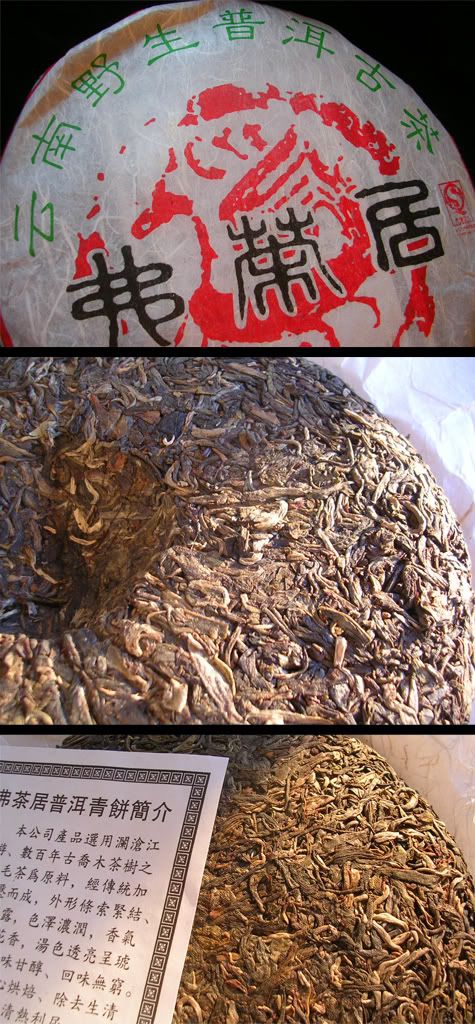
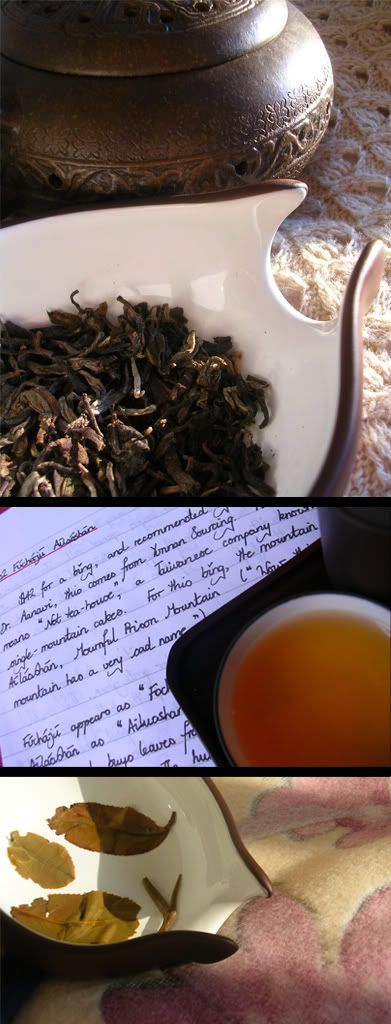
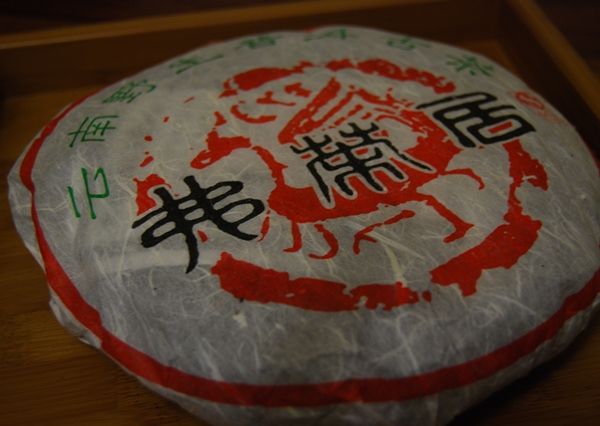
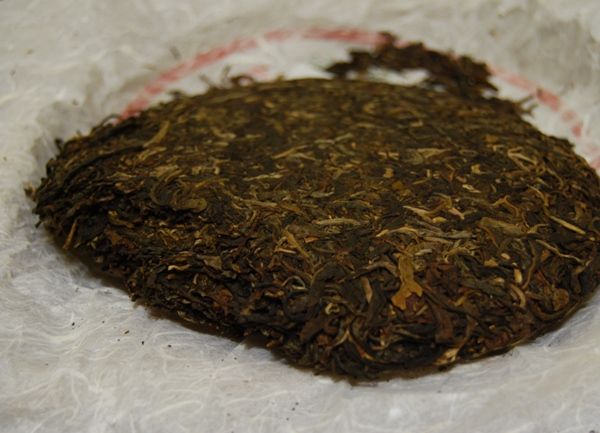
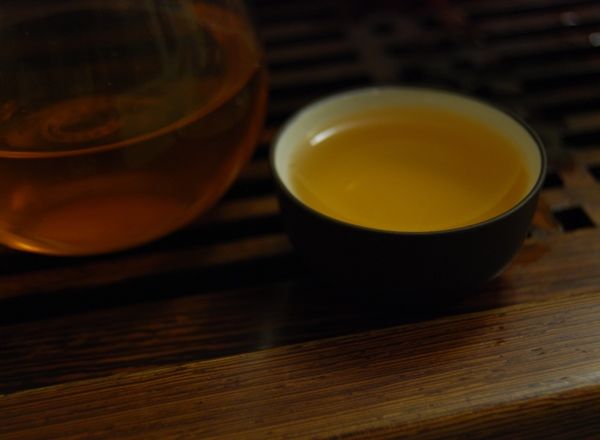
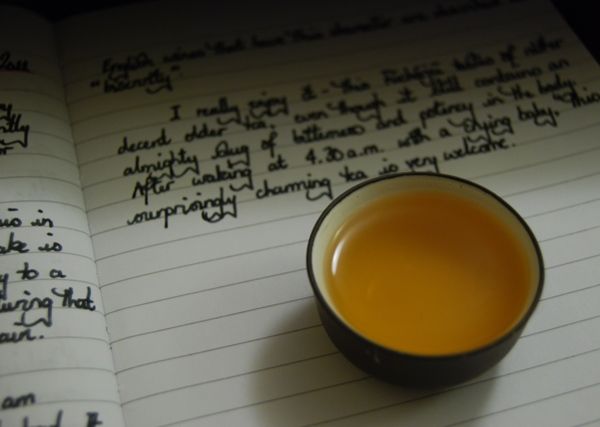
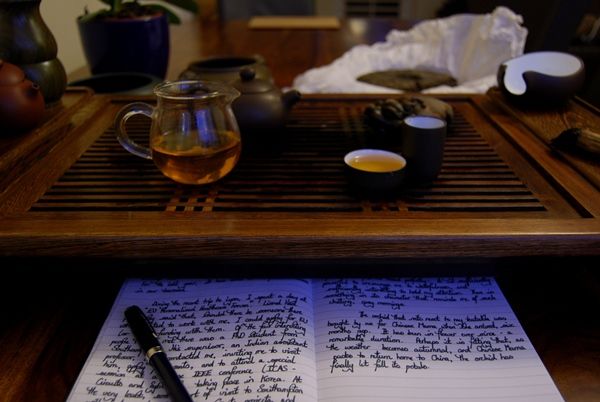
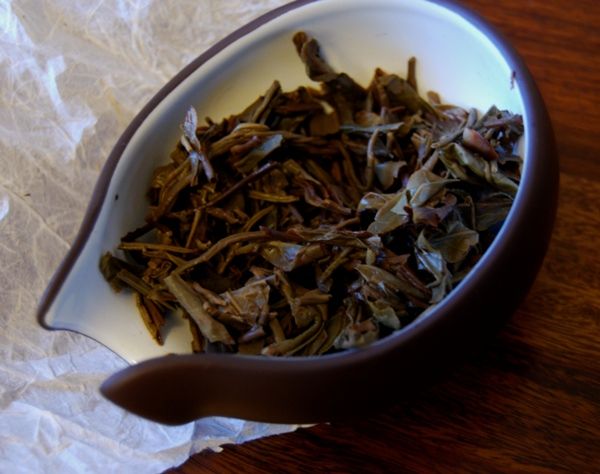
funny--i just sent you a sample of this very same tea today. perhaps when you receive it you'll pass it on to some other deserving soul?
ReplyDeletei'm glad you enjoyed this bing. frankly, i was quite underwhelmed by it, after several tastings. perhaps in part i was a bit disappointed by the limited aging (5 years in kunming, so obviously quite different than tea aged in more humid climes).
moreover, it's a bit floral for my taste. i tend to favor sheng with a more raw, untamed quality; this tea was very nicely blended--almost too much so for my palate.
make no mistake, it's good tea--just not something well suited to my preferences.
mike
ps: geraldo, if you're reading this, have you had a chance to re-taste? davelcorp, i believe you have a sample of this as well. carla, yours is on its way...
From your description, it sounds like a very lovely, enjoyable tea...it seems that my tastes run to the "mundane" in puerh. May have to give this one a try - thanks for the review. :-)
ReplyDeleteHa! I also sent some of this to you yesterday, so you'll be getting it from both me and Mike, and now Mike is sending some to me! (I didn't send any of this one in Mike's package, though, so this isn't COMPLETELY silly.) I like this one for it's straightforward, rustic simplicity and robustness.
ReplyDeleteno, not completely silly, just moderately silly. :)
ReplyDeletewe should all catalog our teas on a web-based database so that we can see who's already got what.
now that's the height of teageekdom...
Dear Mike,
ReplyDeleteThat's very kind of you, thanks! I'll pop it into my sample box to someone else, yes indeed.
Dear Jamie,
It is quite a good tea; I'm glad that you found the review useful!
Dear Carla,
Hah! Thanks also for the imminent samples, then! I've got a few interesting little samples that I am desperately trying to find the time to get to the local Post Office. :)
Toodlepip,
Hobbes
No hurry, please. I get into that dynamic, and things that should be a pleasure become a duty. Take your time.
ReplyDeleteHobbes,
ReplyDeleteI am happy to agree completely with your impressions of this tea. Like you, having read several reviews of praise of this bing I ordered one from Scott.
While I can find no particularly offensive qualities to this tea, I can also find very little that excites me about this. A rather bland tea.
I remember having an email conversation with Michel of Teajar blog. In his straightforward style I think he summed it up well...
"As for the fo cha ji it is an example of a pu ehr that is designed to tick all our boxes, great leaves, beautifully pressed stone bing etc.. but ...but..........no taste."
I agree.
nada.
Dear Nada,
ReplyDeleteVery true. I think Michel has it bang on the head, also.
Toodlepip,
Hobbes
Dear Hobbes,
ReplyDeleteI am curious about your comment that the wrapper states 2005 for this 2002 cake.
I had ordered the 2002 Wu Liang Mountain in 2007 but Scott sent me instead the Ai Luo in a 2006 wrapper. When I wrote him, he replied:
"The fo cha ji cakes are all stored unwrapped. when the boss sells them to me, they break open the tongs and wrap them. the wrapper with green writing is just a new wrapper at the end of 2006."
Due to the bad karma of this cake that I never wanted, never ordered, and was taking the place of Wuliang, I stuck it all the way in the back of the closet. But I am happy to hear it's made something of itself.
H
Dear Hster,
ReplyDeleteThanks for the extra details! The course of a cake never did run true. I am surprised at the twists and turns that arise in the journey of even the most humble cake.
While this cake is humble, it is also rather good. I like it quite a bit, and hope that you are getting on similarly well with your own.
Toodlepip,
Hobbes